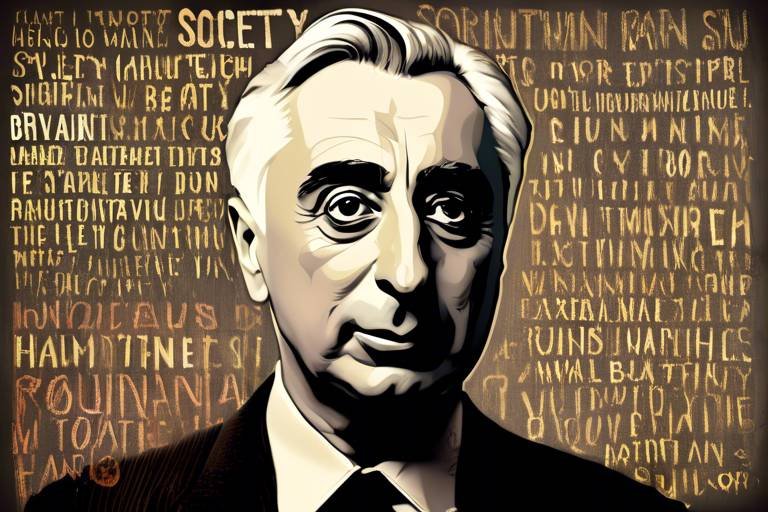The Anarchical Society - A Work of Hedley Bull
In the realm of international relations, few works have had as profound an impact as Hedley Bull's The Anarchical Society. This pivotal text delves into the complexities of global politics, presenting a nuanced understanding of how states interact within a framework characterized by an absence of overarching authority. Bull's insights challenge conventional wisdom by suggesting that even in a world marked by anarchy, order and cooperation are not only possible but essential. His exploration of themes such as sovereignty, the balance of power, and the quest for justice provides a compelling narrative that resonates with scholars and practitioners alike. The significance of Bull's work lies not only in its theoretical contributions but also in its practical implications for understanding the modern state system and its challenges.
Anarchy is often misconstrued as chaos, yet Bull argues that it is a fundamental characteristic of the international system. In his view, anarchy shapes state behavior and influences global politics in profound ways. Without a central authority to enforce rules, states must navigate a landscape where self-interest often reigns supreme. However, Bull emphasizes that this does not lead to inevitable conflict; rather, it necessitates the establishment of order through various means. The absence of a governing body compels states to form alliances and create norms that facilitate cooperation and mitigate the risks of conflict. In this way, anarchy can be seen as a double-edged sword—while it poses challenges, it also provides opportunities for states to collaborate and achieve mutual benefits.
Sovereignty stands at the heart of Bull's analysis, serving as a cornerstone of the international system. States, as sovereign entities, maintain their independence and authority, navigating the complexities of an anarchic world. Bull examines how sovereignty is not merely about power but also about recognition and legitimacy. In a system where states are often at odds, the ability to assert sovereignty becomes crucial for survival and influence. Yet, this quest for sovereignty is fraught with challenges. As globalization and transnational movements gain momentum, the traditional notion of sovereignty is increasingly tested. Bull's insights provide a framework for understanding how states can adapt to these changes while still preserving their sovereignty.
To fully appreciate the concept of sovereignty, Bull places it within a historical context. He traces its evolution from the Peace of Westphalia in 1648, which laid the groundwork for modern statehood, to contemporary challenges posed by non-state actors and international organizations. This historical perspective is essential for understanding the dynamics of current international relations. For instance, the rise of emerging powers and the increasing interdependence among states have transformed the landscape, prompting a reevaluation of what sovereignty means in practice. By examining the historical trajectory of sovereignty, Bull equips us with the tools to analyze contemporary conflicts and the shifting nature of power in the global arena.
As we delve deeper into the concept of sovereignty, it becomes evident that it faces numerous challenges in today's interconnected world. Factors such as globalization, the rise of transnational movements, and the emergence of new powers complicate the traditional understanding of state sovereignty. Bull's insights shed light on how these challenges manifest in various ways, from economic interdependence to the influence of international organizations. For instance, consider how multinational corporations can exert power that rivals that of nation-states, thereby blurring the lines of sovereignty. This evolving landscape raises critical questions about the future of state authority and the mechanisms through which sovereignty can be maintained.
Looking ahead, Bull speculates on the future of sovereignty in an increasingly interconnected world. He poses thought-provoking questions about whether traditional notions of sovereignty can withstand the pressures of global governance and cooperation. As states grapple with transnational issues such as climate change, terrorism, and economic crises, the need for collaborative solutions becomes paramount. Bull's analysis encourages us to rethink sovereignty not as an absolute concept but as a dynamic one that can adapt to the realities of modern international relations. In this context, the future of sovereignty may lie in finding a balance between national interests and the collective good, a challenge that will shape the international landscape for years to come.
One of the most intriguing aspects of Bull's work is his assertion that order and justice are achievable even in an anarchic system. He explores how states can establish norms and institutions that promote stability and fairness in international relations. By creating frameworks for cooperation, states can mitigate the inherent chaos of anarchy and foster a sense of community among nations. Bull argues that the pursuit of justice is not only a moral imperative but also a practical necessity for maintaining order. In this sense, the quest for justice becomes intertwined with the interests of states, as a just order is more likely to be stable and sustainable in the long run.
At the core of Bull's analysis lies the concept of the balance of power. He discusses its significance in maintaining order and preventing conflict among states. The balance of power serves as a stabilizing force, where no single state can dominate the others, thereby fostering a sense of equilibrium. This equilibrium is crucial for preventing wars and ensuring that states can coexist peacefully. Bull's exploration of the balance of power highlights its role as a guiding principle in international relations, shaping interactions and influencing the behavior of states on the global stage.
Bull identifies various mechanisms through which states maintain a balance of power, including alliances, deterrence, and diplomacy. These tools are essential for managing tensions in the international system. For example, alliances can serve as a counterweight to potential aggressors, while diplomacy provides a platform for dialogue and negotiation. By employing these mechanisms, states can navigate the complexities of anarchy and work towards stability. However, the effectiveness of these tools is not guaranteed, and Bull encourages a critical examination of their role in contemporary politics.
While the balance of power is a key concept, Bull also addresses critiques of its effectiveness and relevance in modern global politics. Some scholars argue that the balance of power is an outdated notion that fails to account for the complexities of contemporary international relations. Bull prompts a reevaluation of its role, encouraging us to consider how the balance of power can adapt to changing dynamics. By engaging with these critiques, Bull enriches the discourse on international relations, inviting us to think critically about the mechanisms that govern state interactions.
- What is the main argument of Hedley Bull's The Anarchical Society?
Bull argues that despite the absence of a central authority in international relations, order and cooperation among states are possible through the establishment of norms and institutions.
- How does Bull define sovereignty?
Sovereignty is defined as the authority of a state to govern itself and make decisions independently, which is crucial in navigating an anarchic international system.
- What challenges does sovereignty face today?
Challenges include globalization, the rise of non-state actors, and the influence of international organizations, which complicate traditional notions of state authority.
- What role does the balance of power play in international relations?
The balance of power is essential for maintaining order and preventing conflict, ensuring that no single state can dominate others.

The Anarchical Society,
This article explores the key concepts and themes presented in Hedley Bull's influential work, The Anarchical Society, highlighting its significance in international relations and political theory.
Anarchy is a foundational concept in international relations. Bull discusses how anarchy shapes state behavior and influences global politics, emphasizing the need for order amidst the absence of a central authority. In a world where states operate independently, the idea of anarchy can be daunting. It’s like a chaotic orchestra where every musician plays their own tune without a conductor. Yet, Bull argues that this very chaos can lead to a form of order through mutual recognition and respect among states.
Sovereignty is crucial in Bull's analysis. He examines how states maintain their independence and authority while navigating a system characterized by anarchy, and the implications this has for international cooperation. Sovereignty acts as a shield for states, protecting their rights and interests in a tumultuous international arena. But how do states balance their sovereign rights with the need for collaboration? Bull suggests that the answer lies in the delicate dance of diplomacy, where states negotiate their autonomy while still engaging with one another.
Bull places sovereignty within a historical framework, tracing its evolution and significance in shaping the modern state system. This context helps us understand current international dynamics and conflicts. The concept of sovereignty has transformed dramatically from the Peace of Westphalia in 1648 to the present day, where the rise of multinational corporations and international organizations challenges traditional notions of state power. Understanding this evolution is akin to reading a historical novel where each chapter reveals new complexities and characters that influence the plot of global politics.
The concept of sovereignty faces numerous challenges today, including globalization, transnational movements, and emerging powers. Bull's insights provide a lens through which to analyze these contemporary issues. For instance, globalization acts like a double-edged sword, offering opportunities for economic growth while simultaneously eroding state control over borders and policies. As states grapple with these challenges, they must ask themselves: can sovereignty adapt to the realities of a connected world, or is it destined to become a relic of the past?
Bull speculates on the future of sovereignty in an increasingly interconnected world, questioning whether traditional notions can withstand the pressures of global governance and cooperation. As we move forward, the concept of sovereignty may need to evolve, embracing a more flexible approach that allows for collaboration without sacrificing independence. This evolution is crucial for addressing global challenges such as climate change and international security, where collective action often trumps unilateral decision-making.
Bull argues that order and justice are achievable even in an anarchic system. He explores how states can establish norms and institutions that promote stability and fairness in international relations. Think of it like setting up a neighborhood watch; even without a police force, residents can create rules and expectations that foster a sense of security and cooperation. By developing international laws and agreements, states can navigate the anarchic waters of global politics, ensuring that justice prevails even in the absence of a central authority.
The balance of power is a central theme in Bull's work. He discusses its importance in maintaining order and preventing conflict among states, and how it shapes international interactions. The balance of power operates like a seesaw; when one side rises, the other must adjust to maintain equilibrium. This dynamic is crucial for preventing any single state from dominating the global stage, thus fostering a more stable international environment.
Bull identifies various mechanisms through which states maintain a balance of power, including alliances, deterrence, and diplomacy. These tools are essential for managing tensions in the international system. For example, alliances can provide collective security, acting as a deterrent against potential aggressors. Similarly, diplomacy serves as the oil that keeps the gears of international relations running smoothly, allowing states to negotiate and resolve conflicts without resorting to violence.
While the balance of power is a key concept, Bull also addresses critiques of its effectiveness and relevance in modern global politics, prompting a reevaluation of its role in ensuring stability. Critics argue that the balance of power can lead to arms races and increased tensions, rather than fostering peace. Bull acknowledges these concerns but maintains that understanding the balance of power is essential for navigating the complexities of international relations.
- What is the main thesis of Hedley Bull's The Anarchical Society?
Bull argues that even in an anarchic international system, states can maintain order and justice through norms, institutions, and a balance of power. - How does Bull define sovereignty?
Sovereignty is defined as the authority of a state to govern itself, free from external interference, which is crucial in an anarchic world. - What challenges does sovereignty face today?
Challenges include globalization, transnational movements, and the influence of emerging powers that can undermine traditional state authority. - Can order and justice exist in an anarchic system?
Yes, Bull suggests that through cooperation and the establishment of international norms, states can achieve stability and fairness.

highlighting its significance in international relations and political theory.
This article explores the key concepts and themes presented in Hedley Bull's influential work, The Anarchical Society, highlighting its significance in international relations and political theory.
Anarchy is a foundational concept in international relations. Bull discusses how anarchy shapes state behavior and influences global politics, emphasizing the need for order amidst the absence of a central authority.
Sovereignty is crucial in Bull's analysis. He examines how states maintain their independence and authority while navigating a system characterized by anarchy, and the implications this has for international cooperation.
Bull places sovereignty within a historical framework, tracing its evolution and significance in shaping the modern state system. This context helps us understand current international dynamics and conflicts.
The concept of sovereignty faces numerous challenges today, including globalization, transnational movements, and emerging powers. Bull's insights provide a lens through which to analyze these contemporary issues.
Bull speculates on the future of sovereignty in an increasingly interconnected world, questioning whether traditional notions can withstand the pressures of global governance and cooperation.
Bull argues that order and justice are achievable even in an anarchic system. He explores how states can establish norms and institutions that promote stability and fairness in international relations.
The balance of power is a central theme in Bull's work. He discusses its importance in maintaining order and preventing conflict among states, and how it shapes international interactions.
Bull identifies various mechanisms through which states maintain a balance of power, including alliances, deterrence, and diplomacy. These tools are essential for managing tensions in the international system.
While the balance of power is a key concept, Bull also addresses critiques of its effectiveness and relevance in modern global politics, prompting a reevaluation of its role in ensuring stability.
The significance of The Anarchical Society in the realm of international relations and political theory cannot be overstated. Bull's work provides a profound understanding of how states operate in a world devoid of a central governing authority. By emphasizing the anarchic nature of international relations, he sheds light on the complex interactions between states, which often resemble a chaotic dance rather than a well-choreographed performance. This perspective is crucial as it encourages scholars and practitioners alike to rethink traditional notions of order and governance.
One of the key takeaways from Bull's analysis is the idea that anarchy does not equate to disorder. Instead, it opens up a space for states to create their own rules and norms, fostering a semblance of order amid chaos. This notion is particularly relevant today, as we witness the rise of non-state actors and shifting power dynamics on the global stage. In this light, Bull's insights prompt us to consider how states can collaborate to establish frameworks that promote stability and peace, even when operating under anarchic conditions.
Moreover, Bull's exploration of sovereignty highlights its enduring relevance in international relations. In an era marked by globalization and transnational challenges, understanding how states assert their authority and navigate complex networks of interdependence is essential. His work encourages a critical examination of sovereignty, prompting scholars to explore how it is both challenged and reaffirmed in contemporary contexts.
In summary, Bull's The Anarchical Society serves as a vital reference point for those engaged in the study of international relations and political theory. It offers a nuanced understanding of the interplay between anarchy, order, and sovereignty, providing valuable insights for addressing the pressing issues of our time.
- What is the main argument of Hedley Bull in The Anarchical Society?
Bull argues that despite the anarchic nature of international relations, states can create order through norms and institutions. - How does Bull define anarchy in international relations?
Anarchy, according to Bull, is the absence of a central authority in the international system, which influences state behavior. - What challenges to sovereignty does Bull discuss?
He highlights globalization, transnational movements, and the rise of emerging powers as significant challenges to traditional notions of sovereignty. - Why is the balance of power important in Bull's work?
The balance of power is crucial for maintaining order and preventing conflict among states in an anarchic system.

Understanding Anarchy in International Relations
Anarchy is not merely a state of chaos; rather, it is a fundamental principle that underpins the entire framework of international relations. In Hedley Bull's influential work, he meticulously unpacks the concept of anarchy, illustrating how it shapes the behavior of states and influences the dynamics of global politics. Imagine a world where every nation acts independently, without a central authority to enforce rules or maintain order. This scenario, while daunting, is the reality of international relations. Bull emphasizes that, despite the absence of a governing body, states are compelled to seek order and stability amidst this chaotic backdrop.
One of the key takeaways from Bull's analysis is that anarchy does not equate to disorder. Instead, it provides a unique environment where states must navigate their interactions with one another. They develop their own sets of rules, norms, and institutions to manage conflicts and promote cooperation. For instance, consider how countries engage in diplomacy, form alliances, or participate in international organizations. These actions are not just reactions to an anarchic system; they are proactive measures to create a semblance of order.
Furthermore, Bull argues that the existence of anarchy necessitates a certain level of trust and predictability among states. Without a central authority, nations rely on established norms and mutual agreements to ensure their survival and prosperity. This reliance on trust can lead to a more stable international environment, where states recognize the benefits of cooperation over conflict. In this sense, anarchy can foster a unique form of order, one that is built on the voluntary compliance of states rather than coercive power.
To illustrate Bull's perspective, consider the following elements that highlight how states operate within an anarchic framework:
- Self-Help: In an anarchic world, states must rely on themselves for security and survival. This self-help principle drives nations to build military capabilities and form alliances.
- Interdependence: Despite the chaos of anarchy, states often find themselves interdependent, relying on each other for trade, security, and diplomatic relations.
- Norms and Institutions: States create norms and institutions to facilitate cooperation and manage conflicts, such as the United Nations or various trade agreements.
In conclusion, understanding anarchy in international relations is crucial for grasping the complexities of global politics. Bull's insights reveal that while anarchy presents challenges, it also offers opportunities for states to forge relationships, establish norms, and maintain a degree of order. By recognizing the interplay between anarchy and state behavior, we can better appreciate the nuances of international relations and the ongoing quest for stability in a world defined by independence and competition.
- What is the significance of anarchy in international relations? Anarchy shapes how states interact, compelling them to seek order through norms, institutions, and cooperation despite the absence of a central authority.
- How do states maintain order in an anarchic system? States maintain order by establishing norms and institutions, forming alliances, and engaging in diplomacy to manage conflicts.
- Can anarchy lead to cooperation among states? Yes, while anarchy presents challenges, it can also foster interdependence and cooperation as states recognize the benefits of working together.

The Role of Sovereignty
Sovereignty stands as a cornerstone in Hedley Bull's analysis of international relations, acting as a shield that protects the autonomy of states in a world often described as anarchic. But what does sovereignty really mean in this context? It's not just about having power; it’s about maintaining a state’s identity and authority while navigating through a chaotic international landscape. Bull emphasizes that, despite the lack of a central governing body, states must strive to uphold their sovereignty, which ultimately shapes their interactions with one another. This quest for independence amidst an anarchic backdrop is a delicate balancing act that defines global politics.
In Bull's view, sovereignty is not merely a legal status but a dynamic force that influences state behavior. States operate under the premise that they are independent entities with the right to govern themselves without external interference. This leads to an essential question: how do states assert their sovereignty in a world filled with competing interests? The answer lies in a combination of diplomatic negotiation, military strength, and economic leverage. States often engage in a complex dance of cooperation and competition, ensuring that their sovereignty is respected while also finding ways to collaborate on global issues such as trade, security, and environmental concerns.
To illustrate the significance of sovereignty, consider the following key aspects:
- Independence: States must maintain their independence to make decisions free from external coercion.
- Recognition: Sovereignty is often validated through recognition by other states, which can enhance a state's legitimacy on the international stage.
- Responsibility: With sovereignty comes responsibility; states are expected to uphold certain standards of behavior, particularly regarding human rights and international law.
Bull also delves into the implications of sovereignty for international cooperation. While states may wish to maintain their independence, they often find that collaboration is essential in addressing global challenges. This paradox raises intriguing questions: How can states cooperate without compromising their sovereignty? Are there frameworks in place that allow for such cooperation while respecting individual state rights? The answer lies in the establishment of international norms and institutions that facilitate dialogue and collaboration without infringing upon sovereignty. Treaties, alliances, and international organizations serve as platforms where states can work together while still preserving their autonomy.
However, the concept of sovereignty is not without its challenges. In an age of globalization, where borders are increasingly porous and transnational issues abound, the traditional notions of sovereignty are being tested. For instance, how do states respond to non-state actors, such as international corporations or terrorist organizations, that operate beyond their control? Furthermore, emerging powers are reshaping the landscape of international relations, prompting a reevaluation of established norms. Bull's insights provide a vital lens through which we can analyze these contemporary issues, encouraging us to consider how sovereignty can adapt to the changing global environment.
As we look to the future, Bull speculates on the evolution of sovereignty in an interconnected world. Will traditional notions of sovereignty withstand the pressures of global governance? Or will we see a shift towards a more collective approach to international relations, where states willingly cede some aspects of their sovereignty for the greater good? These questions remain at the forefront of political discourse, making Bull's work not only relevant but essential for understanding the complexities of modern statehood.

Historical Context of Sovereignty
The concept of sovereignty is not just a modern invention; it has deep historical roots that trace back to the formation of the state itself. To understand its significance in today's political landscape, we must journey back through time. Sovereignty, in its essence, refers to the supreme authority of a state to govern itself without outside interference. This idea has evolved dramatically, shaped by various historical events and philosophical debates.
Initially, the notion of sovereignty was closely tied to the idea of monarchies and divine right. Kings and queens ruled with absolute power, often justified by religious beliefs that placed them as representatives of God on Earth. However, as societies progressed, the emergence of the Westphalian system in the 17th century marked a pivotal shift. The Peace of Westphalia in 1648 effectively ended the Thirty Years' War in Europe and established the principle of territorial integrity and non-interference in the affairs of other states. This laid the groundwork for modern statehood and the idea that each state has the right to govern its territory free from external intervention.
As we move into the Enlightenment period, thinkers like John Locke and Jean-Jacques Rousseau began to challenge the traditional views of sovereignty. They introduced ideas about social contracts and the consent of the governed, which shifted the focus from the ruler's divine right to the rights of the individual. This philosophical evolution was crucial in shaping democratic ideals, where sovereignty is vested in the people rather than a monarch.
Throughout the 19th and 20th centuries, the concept of sovereignty continued to adapt. The rise of nationalism and the formation of nation-states further complicated the landscape. In this era, sovereignty began to intertwine with identity, leading to conflicts as various ethnic and cultural groups sought self-determination. The aftermath of World War I and the establishment of the League of Nations exemplified an attempt to create a global order while respecting state sovereignty, albeit with limited success.
Today, we face new challenges to the traditional concept of sovereignty. Globalization, transnational organizations, and the rise of supranational entities like the European Union have tested the boundaries of state authority. The very fabric of sovereignty is being reevaluated as states navigate complex interdependencies. Hedley Bull's insights into these historical developments allow us to understand how the past informs present-day international relations and the ongoing debates surrounding state sovereignty.
In summary, the historical context of sovereignty reveals a dynamic interplay between authority, governance, and identity. As we continue to grapple with these issues, it is essential to recognize that sovereignty is not a static concept but one that evolves with the changing tides of history.
- What is sovereignty? Sovereignty refers to the supreme authority of a state to govern itself without external interference.
- How did the Peace of Westphalia influence sovereignty? The Peace of Westphalia established principles of territorial integrity and non-interference, laying the groundwork for modern statehood.
- What challenges does sovereignty face today? Sovereignty faces challenges from globalization, transnational movements, and the influence of supranational organizations.
- How has the concept of sovereignty evolved over time? Sovereignty has evolved from divine right and monarchic rule to include democratic principles and the rights of individuals.

Challenges to Sovereignty
The concept of sovereignty is under siege in today's rapidly evolving world. As Hedley Bull points out, the traditional notion of state sovereignty is increasingly challenged by a myriad of factors that transcend national borders. This raises critical questions: How can states maintain their authority when faced with global pressures? And what does it mean for the future of international relations?
One of the most significant challenges to sovereignty is the phenomenon of globalization. As the world becomes more interconnected, the ability of states to control their own affairs diminishes. For instance, economic interdependence can lead to situations where domestic policies are heavily influenced by international markets. This can create tension between national interests and global economic realities, often leaving states grappling with the consequences of decisions made far beyond their borders.
Moreover, the rise of transnational movements—such as terrorism, environmental activism, and human rights advocacy—further complicates the landscape of sovereignty. These movements often operate across borders, challenging the authority of individual states. For example, the fight against climate change requires collective action that may necessitate compromising national sovereignty for the greater good. This can lead to a paradox where states must choose between their autonomy and the pressing need for international cooperation.
Another dimension to consider is the emergence of new powers on the global stage. Countries like China and India are reshaping the traditional power dynamics, compelling established powers to reevaluate their strategies. This shift can lead to conflicts over influence and control, challenging the established norms of sovereignty that have governed international relations for centuries.
In light of these challenges, Bull's insights offer a framework for understanding the complexities of sovereignty in the modern world. He suggests that while the traditional concept of sovereignty is being tested, it is not necessarily doomed. Instead, states may need to adapt and redefine their understanding of sovereignty to navigate the intricacies of an interconnected global environment. This adaptability may involve embracing new forms of governance that prioritize collaboration without completely relinquishing state authority.
Ultimately, the future of sovereignty hinges on the ability of states to balance their national interests with the demands of global governance. As the world continues to evolve, the question remains: can sovereignty survive in a landscape where the lines between local and global are increasingly blurred? Only time will tell, but Bull's work provides a valuable lens through which to examine these pressing issues.
- What is the main argument of Hedley Bull in "The Anarchical Society"?
Hedley Bull argues that despite the anarchic nature of the international system, order and justice can be achieved through established norms and institutions.
- How does globalization challenge state sovereignty?
Globalization creates economic interdependencies that can undermine a state's ability to govern independently, often forcing states to align their policies with international standards.
- What role do transnational movements play in the context of sovereignty?
Transnational movements challenge state authority by advocating for issues that cross national boundaries, such as human rights and environmental protection, which can necessitate compromises on sovereignty.
- Can sovereignty survive in today's interconnected world?
While sovereignty faces significant challenges, it may survive by evolving and adapting to new forms of governance that allow for international cooperation without completely sacrificing state authority.

The Future of Sovereignty
The concept of sovereignty is at a crossroads, and Hedley Bull's insights provide a profound understanding of its potential trajectory. As we step into an era marked by rapid globalization and interdependence, traditional notions of sovereignty are being challenged like never before. Imagine sovereignty as a sturdy tree that has stood tall for centuries, but now faces fierce winds of change that threaten to uproot it. How can it adapt and survive in this new environment?
One of the key factors influencing the future of sovereignty is the rise of global governance. With issues such as climate change, terrorism, and pandemics transcending national borders, the need for cooperative frameworks is becoming increasingly evident. States are recognizing that they cannot tackle these challenges in isolation. Instead, they must work together, which raises the question: can states maintain their sovereignty while engaging in these collaborative efforts? Bull suggests that a balance can be struck, where states remain independent yet still cooperate on global issues.
Moreover, the emergence of transnational actors—such as multinational corporations, NGOs, and international organizations—adds another layer of complexity to the sovereignty debate. These entities often wield significant influence, sometimes rivaling that of nation-states themselves. For instance, consider how tech giants can shape public policy and global norms. This shift prompts a reevaluation of what sovereignty means in a world where power is distributed among various players.
To further explore this evolving landscape, we can consider the following potential scenarios for the future of sovereignty:
- Enhanced Multilateralism: States might embrace a more collaborative approach, willingly ceding some aspects of sovereignty in favor of collective action.
- Resurgence of Nationalism: In reaction to globalization, some countries may double down on their sovereignty, prioritizing national interests over international cooperation.
- Hybrid Models: A combination of both approaches could emerge, where states maintain core sovereign powers but engage in selective cooperation on global issues.
As we ponder these possibilities, it's essential to recognize that the future of sovereignty will likely involve a dynamic interplay between national interests and global imperatives. Bull's analysis prompts us to ask: how can states navigate this complex terrain without losing their identity and authority?
In conclusion, while the future of sovereignty is uncertain, it is clear that it will be shaped by the forces of globalization, the rise of transnational actors, and the ongoing quest for balance between independence and cooperation. As we move forward, the challenge will be to redefine sovereignty in a way that acknowledges these changes while preserving the essential qualities that have made it a cornerstone of international relations.
- What is sovereignty? Sovereignty refers to the authority of a state to govern itself and make its own laws without external interference.
- How does globalization affect sovereignty? Globalization can challenge traditional notions of sovereignty by increasing interdependence among states and empowering non-state actors.
- Can states maintain their sovereignty while cooperating internationally? Yes, states can find a balance between maintaining their sovereignty and engaging in international cooperation on global issues.
- What are some challenges to sovereignty today? Challenges include globalization, transnational movements, and the influence of multinational corporations and NGOs.

Order and Justice in Anarchy
In Hedley Bull's influential work, he presents a compelling argument that even in a world characterized by anarchy, the principles of order and justice can still prevail. Imagine a bustling marketplace where chaos reigns, yet amidst the noise and hustle, vendors establish their own rules to ensure fair trade. This analogy reflects Bull's assertion that states can create a semblance of order, even without a higher authority governing their interactions.
At the heart of Bull's argument is the belief that states, while operating in an anarchic environment, can develop norms and institutions that foster stability and fairness. These norms act much like the unwritten rules in a community; they guide behavior and help to mitigate conflicts. For instance, consider how international treaties and diplomatic agreements serve as frameworks that promote cooperation among states. These agreements, though not enforced by a central authority, create a sense of obligation and encourage states to act in ways that uphold justice and order.
Furthermore, Bull emphasizes the significance of shared values and collective goals in establishing order. When states recognize common interests—such as combating climate change or addressing terrorism—they are more likely to collaborate, creating a network of mutual respect and understanding. This cooperation can be likened to a group of neighbors coming together to maintain a clean and safe community. They may not have a governing body overseeing their actions, but their shared commitment to their environment fosters a sense of order and justice.
However, achieving order and justice in an anarchic system is not without its challenges. Conflicting interests, power disparities, and historical grievances can hinder cooperation. To navigate these complexities, Bull suggests that states must engage in dialogue and negotiation, much like a mediator facilitating a dispute between two parties. This process requires patience, empathy, and a willingness to compromise, but the rewards—a more stable and just international system—are well worth the effort.
In summary, Bull's exploration of order and justice in anarchy highlights the potential for states to work together to create a more stable world. By establishing norms, fostering cooperation, and engaging in constructive dialogue, states can transcend the limitations of an anarchic system. The challenge lies in recognizing that while anarchy may be the backdrop of international relations, it does not preclude the possibility of achieving order and justice.
- What is the main argument of Hedley Bull in "The Anarchical Society"?
Bull argues that even in an anarchic international system, states can establish order and justice through norms, institutions, and cooperation. - How do states maintain order without a central authority?
States maintain order by creating shared norms, engaging in diplomacy, and forming alliances that promote stability and cooperation. - What are some challenges to achieving justice in an anarchic system?
Conflicting interests, power imbalances, and historical grievances can complicate efforts to achieve justice and order among states.

The Balance of Power
The concept of balance of power is not just a theoretical construct; it's a fundamental principle that governs the interactions among states in the international arena. In Hedley Bull's analysis, he emphasizes that this balance is crucial for maintaining order and preventing conflicts. Imagine a tightrope walker, skillfully balancing on a thin wire high above the ground. Just as the walker must adjust their movements to stay upright, states must constantly navigate their relationships and power dynamics to avoid falling into chaos.
At its core, the balance of power operates on the principle that when one state becomes too powerful, others will naturally align against it to restore equilibrium. This dynamic is akin to a game of tug-of-war, where each side pulls against the other to maintain a steady position. Bull articulates that this balance is not merely about military strength; it encompasses political, economic, and even cultural dimensions. The interplay of these factors creates a complex web of interactions that shape global politics.
To illustrate this concept further, consider the following key mechanisms through which states maintain a balance of power:
- Alliances: States often form alliances to bolster their security and counterbalance potential threats. These partnerships can shift based on changing interests and perceptions of power.
- Deterrence: The threat of retaliation can prevent aggressive actions. States may invest in military capabilities not to wage war but to deter others from initiating conflict.
- Diplomacy: Engaging in dialogue and negotiation can help resolve tensions and foster cooperation, thus contributing to a more stable international environment.
However, Bull does not shy away from addressing the critiques of the balance of power. Some scholars argue that this concept may be outdated in our increasingly interconnected world, where non-state actors and global issues like climate change challenge traditional notions of state sovereignty and power dynamics. For instance, how do we account for the influence of multinational corporations or international organizations in shaping global governance? Bull's work encourages us to critically reevaluate the balance of power's relevance and effectiveness in contemporary international relations.
As we reflect on the balance of power, it's essential to recognize its dual nature. While it serves as a mechanism for maintaining order, it can also lead to instability and conflict if mismanaged. The challenge lies in finding a delicate equilibrium that promotes cooperation without sacrificing the autonomy of states. In a world where power is constantly shifting, the balance of power remains a pivotal concept that continues to shape our understanding of international relations.
- What is the balance of power? The balance of power is a principle in international relations that suggests states will act to prevent any one state from becoming too powerful, thereby maintaining stability.
- How does the balance of power work? States maintain a balance of power through alliances, deterrence, and diplomacy, adjusting their strategies based on the actions of others.
- Why is the balance of power important? It helps prevent conflicts and promotes stability in the international system by ensuring that no single state dominates.
- What are the critiques of the balance of power? Critics argue that the balance of power may be outdated due to globalization and the rise of non-state actors, challenging traditional state-centric views.

Mechanisms of Balance
In the intricate dance of international relations, the balance of power serves as a critical mechanism that states employ to navigate the choppy waters of anarchy. Hedley Bull meticulously outlines several key strategies that nations utilize to maintain this balance, ensuring that no single state can dominate the others. This balance is not merely a theoretical concept; it is a practical necessity that shapes diplomatic interactions and military strategies across the globe.
One of the primary mechanisms Bull highlights is alliances. States often band together, forming coalitions that enhance their collective security. For instance, NATO (North Atlantic Treaty Organization) exemplifies how countries can unite to deter aggression from a common adversary. By pooling resources and sharing intelligence, these alliances create a formidable front that helps maintain peace and stability. However, the dynamics of alliances can be complex, often leading to shifting loyalties and the potential for conflict, as seen in various historical instances.
Another vital tool in the balance of power is deterrence. This strategy revolves around the idea that the threat of retaliation can prevent aggressive actions by other states. The concept of mutually assured destruction during the Cold War is a prime example; the sheer potential for catastrophic consequences kept superpowers in check. Deterrence can take many forms, including military capabilities and economic sanctions, and it plays a crucial role in shaping state behavior.
Moreover, diplomacy is an indispensable mechanism in maintaining the balance of power. Through diplomatic negotiations, states can resolve conflicts, forge agreements, and manage tensions without resorting to violence. Bull emphasizes that effective diplomacy requires not just the willingness to negotiate but also the ability to understand and navigate the interests and motivations of other states. This intricate web of relationships often determines the success or failure of international policies.
In summary, the mechanisms of balance—alliances, deterrence, and diplomacy—are essential components of Bull's analysis. They illustrate how states strive to create a stable international order amidst the chaos of anarchy. However, the effectiveness of these mechanisms can vary greatly depending on the context and the actors involved. Understanding these dynamics is crucial for anyone looking to grasp the complexities of global politics.
- What is the balance of power? The balance of power refers to a situation in international relations where power is distributed among various states to prevent any one state from becoming too powerful.
- How do alliances contribute to the balance of power? Alliances allow states to combine their resources and capabilities, enhancing their security and deterring potential aggressors.
- What role does deterrence play in international relations? Deterrence aims to prevent conflict through the threat of retaliation, thus maintaining stability and order in the international system.
- Why is diplomacy important in maintaining the balance of power? Diplomacy facilitates communication and negotiation between states, helping to resolve conflicts and manage relationships without resorting to violence.

Critiques of the Balance of Power
The concept of the balance of power has long been a cornerstone in the study of international relations, but it is not without its critics. Scholars and practitioners alike have raised various concerns regarding its effectiveness and relevance in today’s complex global landscape. One of the primary critiques is that the balance of power theory often oversimplifies the intricate web of international interactions. Critics argue that it fails to account for the influence of non-state actors, such as multinational corporations and terrorist organizations, which play significant roles in shaping global politics.
Moreover, the traditional view of the balance of power assumes that states act rationally and prioritize their national interests. However, this perspective can be misleading. In reality, states may engage in irrational behavior driven by domestic politics, cultural factors, or misperceptions of threats. This unpredictability can disrupt the delicate balance and lead to unforeseen conflicts.
Another significant critique revolves around the notion that the balance of power inherently promotes stability. While it may prevent any one state from becoming too powerful, it can also lead to a security dilemma, where states, in their quest for security, inadvertently provoke insecurity in others. This can create a vicious cycle of arms races and escalating tensions, ultimately undermining the very stability that the balance of power seeks to achieve.
Furthermore, the rise of globalization complicates the traditional understanding of power dynamics. As nations become more interconnected through trade, technology, and communication, the rigid binaries of power distribution become less applicable. Critics argue that the balance of power theory does not adequately address the interdependence of states in a globalized world, where economic and environmental issues transcend national borders.
To illustrate these critiques, consider the following table that summarizes key arguments against the balance of power theory:
| Critique | Description |
|---|---|
| Oversimplification | Neglects the role of non-state actors in global politics. |
| Irrational Behavior | Assumes states always act rationally, ignoring domestic and cultural influences. |
| Security Dilemma | Can lead to arms races and increased tensions rather than stability. |
| Globalization | Fails to account for the complexities of interdependence in a globalized world. |
In light of these critiques, it is essential to reevaluate the balance of power's role in contemporary international relations. While it remains a valuable framework for understanding state interactions, it must be adapted to reflect the realities of a rapidly changing world. This might involve integrating insights from other theories, such as constructivism or liberalism, to create a more holistic understanding of power dynamics. Ultimately, the challenge lies in finding a balance between traditional concepts and the evolving nature of global governance.
- What is the balance of power theory?
It is a concept in international relations that suggests that national security is enhanced when military power is distributed so that no one nation is strong enough to dominate all others.
- Why do some scholars criticize the balance of power?
Critics argue that it oversimplifies complex international relations, neglects non-state actors, and does not account for irrational state behavior.
- How does globalization affect the balance of power?
Globalization creates interdependencies that challenge the traditional notions of power distribution, making it more complex and multifaceted.
- Can the balance of power still be relevant today?
While it remains a foundational concept, it must be adapted to incorporate the realities of modern international relations, including globalization and the rise of non-state actors.
Frequently Asked Questions
- What is the main argument of Hedley Bull in "The Anarchical Society"?
Hedley Bull argues that despite the absence of a central authority in international relations, order and cooperation can still be achieved among states. He emphasizes the importance of norms, institutions, and the balance of power in maintaining stability within an anarchic system.
- How does Bull define anarchy in the context of international relations?
Anarchy, according to Bull, is not chaos but rather a condition where states operate independently without a higher authority. This framework influences state behavior and necessitates the establishment of order through norms and cooperative mechanisms.
- What role does sovereignty play in Bull's analysis?
Sovereignty is pivotal in Bull's work as it represents the independence and authority of states. He examines how states navigate an anarchic system while maintaining their sovereignty, which is essential for international cooperation and stability.
- What challenges to sovereignty does Bull discuss?
Bull highlights several challenges to sovereignty, including globalization, the rise of transnational movements, and the emergence of new powers. These factors complicate traditional notions of state authority and require a reevaluation of sovereignty in the modern context.
- Can order and justice be achieved in an anarchic system?
Yes, Bull argues that order and justice are attainable even in an anarchic environment. He explores how states can create norms and institutions that foster stability and fairness, thus promoting a more just international order.
- What is the balance of power, and why is it important?
The balance of power is a crucial concept in Bull's work, referring to the distribution of power among states to prevent any single entity from dominating. It is vital for maintaining order and preventing conflicts in international relations.
- What mechanisms do states use to maintain a balance of power?
States employ various mechanisms such as forming alliances, deterrence strategies, and diplomatic negotiations to sustain a balance of power. These tools are essential for managing international tensions and ensuring stability.
- What critiques does Bull address regarding the balance of power?
Bull acknowledges critiques of the balance of power, particularly its effectiveness in the contemporary global landscape. He prompts a reevaluation of its relevance, suggesting that while it remains important, it may need adaptation to address modern challenges.



















